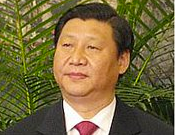Change Of Guard In China – Analysis
By JTW
By Rizwan Asghar
China’s communist party has unveiled the new set of top leaders who will run the country for the next decade. Xi Jinping has replaced Hu Jintao as the party general secretary and will also take over as president in 2013. Another important person is Li Keqiang who has replaced Wen Jiabao as the Prime Minister of China. Since the 1990s, China’s top leaders have established the norm that they serve a maximum of two five-year terms in office. Another important development is that membership in the Politburo, the most powerful policy-making body in China, has been reduced from 25 to 22 and the Standing Committee’s membership from nine to seven.

This will be the fifth time a change of leadership has occurred since the People’s Republic of China was established in 1949. The first generation ruled from 1949 until the death of Mao Zedong in 1976. The second generation was ruled by Deng Xiaoping until he stepped down in 1992. This was the year the Politburo and Standing Committee were reformed. The third generation, under the leadership of Jiang Zemin, focused on political harmony, intellectual progress and economic development seeking to implement the famous “tripartite plan.” The fourth generation, consisting mostly of technocrats, took over in 2003 under the leadership of Hu Jintao. The rulers of this generation focused on developing technology and production capabilities.
The fifth generation has come to power this month. These new leaders are the first group of politicians whose formative experiences were shaped during the Cultural Revolution (1967-77), a time of deep social and political turmoil in which the Mao regime was empowering hard-liners to purge their political opponents in the bureaucracy and Communist Party. Over the past few weeks, China’s military has also witnessed a sweeping change in leadership. The military’s influence over China’s politics and policies has rapidly increased over the past decade, as the country has modernized its forces and developed its capabilities in response to growing international involvement and challenges to its internal stability.
This once-in-a-decade leadership transition event of potentially greater significance has largely been ignored by the world media, but decisions made over the past few days at the 18th Party Congress will critically affect the future direction of China’s economy, politics and foreign relations. Given China’s significant position in the global community and international economy, the future composition of the Politburo Standing Committee (PSC) is important—not just for China, but for the rest of the world.
China is facing a crucial situation. It is confronted with a widening gap between rich and poor, rampant corruption, rising public unrest about issues like pollution and land seizures, and unsustainable urbanization. Despite China’s thirty years of steadily growing prosperity, which has lifted millions out of poverty, there are significant imbalances in the system that will take much effort to correct. A system that, in the words of the outgoing premier Wen Jiabao, is “unstable, unbalanced, uncoordinated, and unsustainable.” But the new line-up of the Politburo’s Standing Committee is predominantly packed with conservatives and highly unlikely to adopt major reform policies in the next ten years. They will bring limited socio-economic reforms only to consolidate their political authority and maintain regime stability.
In China, the word “reform” means different things to different people. The reform that new leaders want may not be the same reform being demanded by the common people in the streets. For some, reform means further liberalization of the economy and moving toward a more market-oriented approach to banking and investment. For others, reform means cleaning up the unchecked corruption by public officials. China’s rulers are not interested in political reforms and political dissent has always been ruthlessly put down.
Fast-growing internet access in recent years has enabled the Chinese people to supervise and analyze the activities of party officials, leading to the disclosure of several major corruption cases. These cases have severely damaged the public credibility of the CCP. Protests are breaking out in China on a daily basis, averaging approximately 500 recorded protests per day. These protests range from demands for increased freedom of expression to protests over working conditions. While most of these protests have been small in scale with the spread of social media, there is a risk that these protests may eventually boil over into full civic unrest. But one thing for sure is that China’s rulers will not be able to keep a lid on the discontent for so long.
Rizwan Asghar is a Pakistan-based defense analyst. He can be reached at [email protected].
